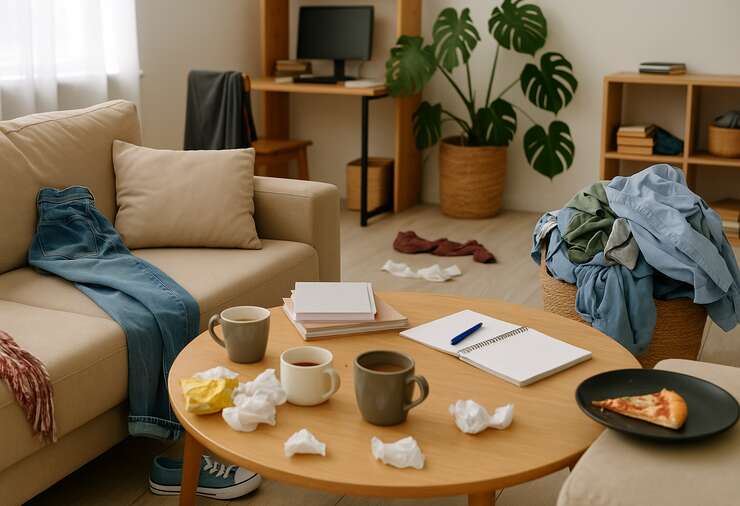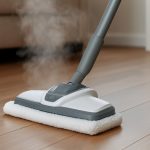Living in Clutter: How It Affects Your Mental Health
Picture this that you swing open the door, plop down on the couch, and suddenly feel like someone hit the pause button on your energy. Outdated homework on the coffee table, dishes wobbling in the sink, and a trail of sneakers leading to the front door all add up to more than a bad Snapchat story; they sneak into your head and drain a bit of happy juice without asking first. The truth is, the room around you has a backstage pass to your mood and your brain, and it doesn’t bother to knock.
Giving the place a quick straighten-up does more than impress; it actually improves your nervous system, you can’t see. Still wondering why that stack of magazines is such a silent energy thief? Let’s list eight sneaky ways given by Bond Cleaning Perth that a crowded corner can score free hits against your focus, your health, and even the way you talk to friends and family.
1. Messy Rooms Pump Up Worry
A pile of clothes on the chair can turn right into a spike of tension. Scientists say clutter crowds the mind the way too many tabs jam a web browser. That visual buzz tricks you into thinking another chore is waiting even when the day is done. Families usually call a house home because it is supposed to feel calm, not like the inside of a pinball machine. Grappling with ongoing mess quietly trains the brain to stay defensive, so a cereal bowl left on the table suddenly feels like an emergency. Cleaners like Maria Kondo say each loose sock is really a tiny alarm bell, and gardening experts answer, Yes.
2. Clutter Makes It Tough to Sleep
Forty sweatshirts tossed over the chair might look cozy, but they actually fight your eyelids the moment you hit the pillow. Researchers found that folks who snooze in a chaotic bedroom wake up more often and give their sleep a lower score than people who keep things neat. When toys or homework are sprawled everywhere, the brain mistakes the room for a To-Do list rather than a place to power down. Even a loose shoelace on the floor can poke at your thoughts, saying Finish me! Finish me! Rest, which the body needs like midnight pizza after gym class, comes easiest in a calm, ordered space.
3. A Dirty House Can Make You Sick
Dust, pollen, and mold settle thick in boxes and carpet edges, then float into your lungs each time you breathe. People with asthma or allergies feel those invisible particles the most; they cough, wheeze, and sniff almost at once. Mold that hides under the sink or behind the toilet can grow colonies in just a few damp days, and that cradle for spores can turn into a cradle for bacteria, too. The tiny organisms show no mercy, sneaking into small cuts or scratches and causing infections that linger far longer than the first mess did. What starts as a forgotten sock or an unused teacup very quickly becomes a health risk if the habit repeats itself week after week.
4. Clutter Steals Your Attention
Sitting down to homework while snack wrappers and old mail crowd the desk feels a bit like trying to shout in a thunderstorm- sound keeps breaking through. Because the brain notices every single shoe, report, and coffee stain, real focus runs off to chase whatever catches the eye. Losing five minutes to hunt down house keys is nothing compared to losing the whole evening to a clouded head. When every whiteboard marker, paper clip, and charger stand right where it belong, the mind stays clear and errands finish on time. A calm room rarely solves deep problems by itself, yet the clarity it offers nearly always gives fresh ideas the breathing space they need.
5. Your Space Can Wreck Your People’s Vibes
Picture walking into your living room and sidestepping a pair of sneakers, an old pizza box, and last month’s homework, as per Bond Cleaning Sunshine Coast. No one gets pumped about crash-landing in that scene-not a partner, a roommate, or even a visiting grandparent. When tidy means one thing to you and something totally different to the person sharing the couch, sparks start flying. Arguments about who left what where can spiral fast, and pretty soon the whole place feels like a referee-less boxing ring. That same clutter keeps you from hitting up friends because youre just plain embarrassed. Comfy homes turn into pressure cookers, and the first thing to go is the chill bond you thought you had with the people you care about-even yourself.
6. Diminishes Motivation and Energy
Seeing a tower of plates in the sink is like a giant banner that says, Later, buddy, take a nap instead. A dishevelled room whispers that your brain is also running on low battery. Each pile of schoolwork, each stray sock, turns a tiny chore into a mountain you have to summit before breakfast. Because the mountain looks huge, you freeze, put on headphones, and end up binging another episode. Week after week, that loop grinds away at your motivation for anything that isnt automatic. Clear off one tabletop or fold just one load and, boom, your mood throws a mini dance party. That spark often spreads, nudging you to finish a project, call a pal, or maybe even sketch out a dream for next year.
7. It Undermines Self-Esteem
Picture walking into your living room and tripping over yesterday’s backpack. A scene like that whisper-shouts, You cant even handle today. When your space feels chaotic, your brain ranks that as proof you are falling behind. A neat room, in stark contrast, lets you stand a little taller. You notice the dining table is clear and think, Huh, I did that. That small victory echoes through the day and colors how you treat yourself. In short, the walls around you act like a backstage mirror, reflecting how kindly you are willing to look at yourself.
8. It Inhibits Mindfulness and Emotional Balance
Mess piles up like white noise that never turns off. You cant meditate if your mind is ticking through the laundry that isnt even sorted yet. Because of that mental chatter, a deep breath feels more like a shallow shrug. Clear surfaces let you sink into a book or a quiet chat without your eyes wandering toward chores. When things are in their right place, feelings slide into their right place, too. A tidy home doesnt just backdrop personal growth; it shows up as an active player, nodding along as you heal.
Wrap-Up: A Neat Room, a Brighter Head
Believe it or not, the way your bedroom looks can actually weigh on how your brain works. A pile of shoes by the door or snack wrappers on the desk might feel harmless, but that mess quietly chips away at your energy, mood, and even the patience you have for family and friends. The silver lining, luckily, is that you dont have to go full-Spartan to feel the lift. Moving a few books off the floor each night or giving the kitchen counter a quick wipe can shave seconds off the stress hanging around your shoulders, and those seconds add up fast.
The next time you catch yourself groaning at a tangle of stuff, try flipping the script- cleaning is less a dull chore than an act of kindness you grant yourself. Its bravery, therapy, and a dash of magic all packed into one spray bottle and a rag.
Also learn about 8 Things in Your Home You Are Forgetting to Clean and Dust






